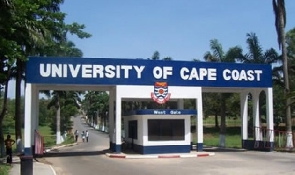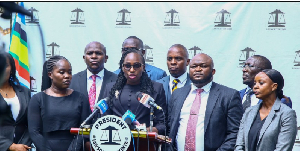As part of its commitment to deepen the culture of excellence in research and entrepreneurship, the University of Cape Coast (UCC) has committed GH¢600,000 to fund research projects.
This move, according to Professor Johnson Nyarko Boampong, Vice-Chancellor of UCC, is consistent with its vision of positioning the University as the centre of academic excellence on the African continent through its scholarly and professional endeavours.
Speaking at the fifth research awards and grants ceremony of UCC on Tuesday, the Vice-Chancellor said the amount was from the Internally Generated Funds (IGF), aside from research grants the university received from external partners.
The ceremony, which was aimed at motivating and honouring members of faculty who distinguished themselves through impact-oriented research as well as those who have shown potential in the same regard brought together stakeholders in the scientific research industry space.
Prof Boampong revealed that the amount would be increased to one million Cedis in the next academic year to ensure that many important research projects were supported.
He said the UCC instituted the Best Researcher Award and Research Support Grants in 2016 to encourage research excellence and innovation to ensure the university’s societal relevance.
He said the university also developed a research agenda for the period 2018 to 2022 in line with the United Nation’s Sustainable Development Goals (SDGs), the Africa Union’s Agenda 2063, and Ghana’s National Development Plan 2057.
According to him, many research projects funded by the university under the research support grant scheme had yielded scholarly research output in high impact journals index and had contributed to making UCC eligible for the Times Higher Education Global ranking.
He assured that despite the financial challenges, UCC would continue to progressively support the scheme financially to promote research and innovation for national development and transformation of livelihoods.
Prof. Nyarko Boampong underscored the critical role universities played in the development of every nation through the training of human resources, cutting-edge research, and provision of community service.
He noted that the creation of knowledge and its dissemination were crucial for providing evidence-based innovative solutions to societal developmental challenges.
Professor Gordon Akanzuwine Awandare, Director, West African Centre for Cell Biology and Infectious Pathogens at the University of Ghana advised faculty members to be more aggressive, focused, and persistent and striving for excellence.
Speaking on the topic: “Building Research Intensity Ecosystem in Africa”, Prof Awandare lamented about Africa’s abysmal contribution to global research production, which he said had been so due to lack of investment from its governments.
He, therefore, called on African governments to move towards research intensity by showing sustained commitment to funding science, research, and innovation, which were essential for the sustainable development of the continent.
Professor Frederick Ato Armah, Director of Directorates of Research, Innovation, and Consultancy (DRIC) noted that the research grant which was formerly for only teaching senior members had now been expanded to include non-teaching senior members who as part of their promotion needed to publish.
He said the directorate identified a number of research proposals that had great potential for social impact, for health and well-being, economic development as well as socio-economic development and gave special funding to ensure that they made an impact beyond the institution.
Click to view details



General News of Friday, 6 November 2020
Source: GNA

















